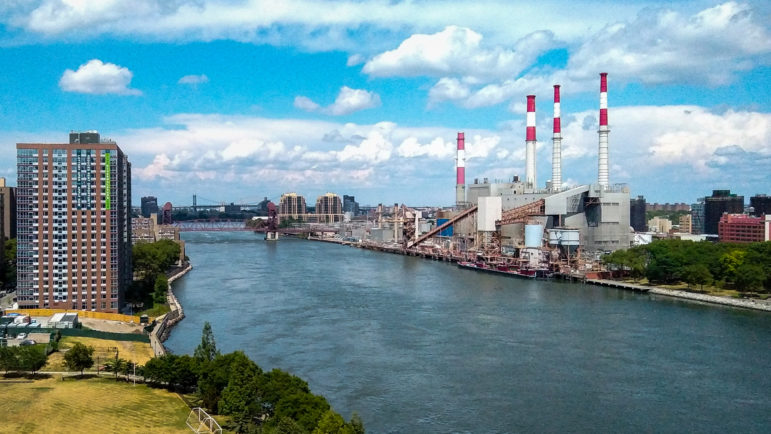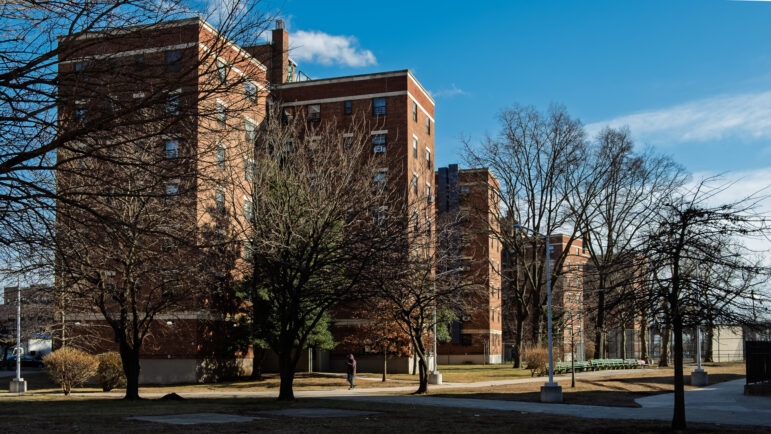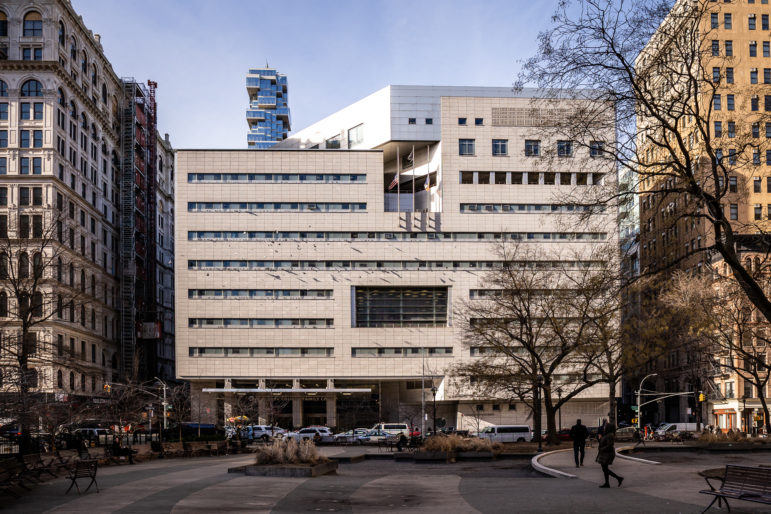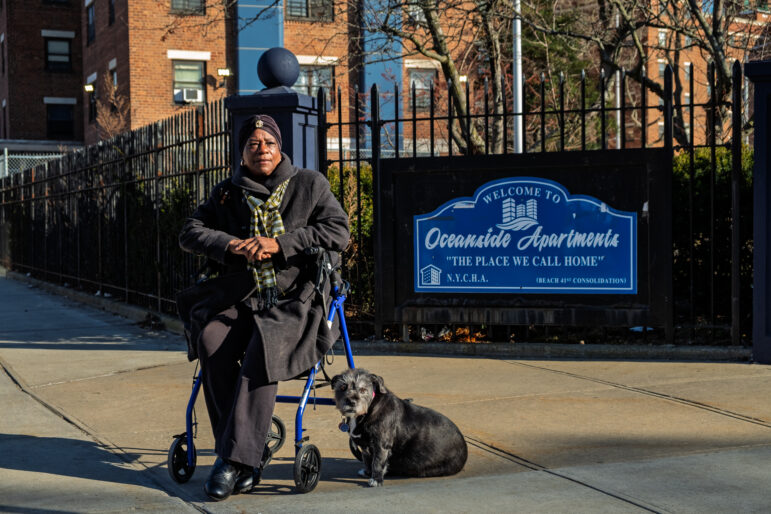“The answer is clear. We need to stop burning fossil fuels in buildings. It’s not too late for New York’s gas utilities to help us do that.”

Adi Talwar
Worried about the climate crisis? Live in Brooklyn, Long Island, or Upstate? Bad news: your gas bill is paying for anti-climate disinformation.
Nearly all of New York’s gas utilities—National Grid, National Fuel, Central Hudson, NYSEG, and RG&E—are working to defeat our state’s nation-leading climate law, the 2019 Climate Act. Working hand in glove with the fossil fuel industry, they’ve spent millions on fear-mongering ads, robocalls, and lobbyists to fight the inevitable: cheap, pollution-free heat for all New York’s buildings.
The Climate Act requires New York to stop warming the planet by 2050, and the state’s Climate Action Council recently released a plan to get us there. The number one source of our state’s climate pollution is the fossil gas we burn to cook our meals and heat our homes and buildings. The only viable way to eliminate this pollution is to stop burning gas in buildings and replace it with electricity: swapping gas ranges for induction stoves, and fossil-fueled heating for heat pumps, which provide efficient heating and cooling.
For gas utilities, this represents an existential threat. They have a choice: utilities could embrace this clean electric future–and save their business–by replacing the gas pipes under our streets with geothermal pipes that pull heat from underground into our homes.
Or they could dig their heels while the planet burns. With the notable exception of Con Edison, New York State’s gas utilities have chosen the latter, dedicating themselves to spreading climate disinformation and false solutions in order to confuse the public.
To help them pull it off, they’ve called in the pros: the American Petroleum Institute, the fossil fuel industry’s notorious lobbying arm, which has spent decades spreading climate denial on behalf of Chevron and ExxonMobil. Through New Yorkers for Affordable Energy (NYFAE), their cynically-named front group, API and the utilities have followed the standard playbook for attacking clean energy: sow doubt about affordability and reliability, propose totally unrealistic alternatives, and stoke rage against elected officials.
In 2022, through TV, print, and Facebook ads, and thousands of mailers, NYFAE spread the lie that the All-Electric Building Act, a law to make new buildings all electric, would force owners of existing buildings to shell out $30,000 to replace their gas appliances. They also flooded key legislative districts with robocalls, spooking constituents and then directing their manufactured fear at legislators.
Gov. Kathy Hochul’s budget proposal, released on Feb. 1, embraces the goal of phasing fossil fuels out of new small buildings by 2025, and new large buildings by 2028. But an internal document from NYAE details the utilities’ plan to sink the governor’s initiative by doubling down on scare-mongering ads and robocalls.
After a global warming-induced blizzard blanketed Buffalo in four feet of snow during the holidays, claiming nearly 50 lives, the utilities knew just what to do: blanket the city with lies about the unreliability of heat pumps. The spending spree appears to have worked: the city of Buffalo just passed a resolution calling on the state to stop implementing its climate plan. Never mind the fact that at least 11 people died in homes with fossil fuel heating that failed during power outages, a tragedy that could have been avoided with battery-powered heat pumps.
With lives on the line, the governor is right to champion all-electric buildings. They aren’t just essential to safeguarding our kids’ futures–they’re also better for homes, lungs, and pocketbooks. If you love your gas stove, you’ll be happy to learn that induction stoves are more responsive, easier to clean, and can boil water in under two minutes. Kids can’t burn themselves on the cooking surface, and won’t inhale air pollution comparable to second-hand smoke.
Then there are heat pumps, which capture heat from the air or ground, even at freezing temperatures, and move the heat inside when you need a warm house. They double as air conditioners, pushing the heat outside when you need a cool house.
Because heat pumps use a third of the energy to heat your home, they save money long term. And they just got dramatically cheaper, thanks to new federal and state rebates: the average-sized home in New York can save between $7,000 and $15,000 on a new heat pump system. As heat pumps become mass produced, prices will drop further. So will heating bills, as ever-cheaper solar panels and batteries drive down electricity costs. And that’s why gas utilities are running scared.
Of course, utilities know they can’t get away with simply opposing climate action. So, besides lying to New Yorkers about all-electric buildings, they’re also selling them a pipedream: “renewable natural gas” (RNG). On paper, RNG is appealing: Methane leaks out of landfills, wastewater plants, and cow manure. These leaks make up nearly 15 percent of New York’s climate pollution.
The fossil fuel industry says this gas is already leaking into the atmosphere, why not capture it and use it to heat our homes? But RNG has four fatal flaws. First, the existing gas network is already full of leaks, and methane has 80x the warming power of carbon dioxide. So RNG isn’t actually climate-friendly at all.
Second, New York leads the nation in deaths and sickness from building air pollution, and a long history of racist zoning laws and locating industrial facilities in communities of color has ensured that people of color suffer the worst health impacts of our fossil fueled energy system. Electrification would end building pollution at last; RNG would lock it in for good.
Third, there’s nowhere close to enough RNG out there to replace fossil gas. According to the gas industry’s own forecasts, New York’s in-state RNG production in 2040 would replace only 13 percent of fossil gas burned by buildings today. Fourth, we should be preventing methane leaks from landfills and manure pits, not burning them and polluting neighboring communities. The solution is to scale organic recycling and climate-friendly manure management.
The answer is clear. We need to stop burning fossil fuels in buildings. It’s not too late for New York’s gas utilities to help us do that.
They could support the Climate, Jobs and Justice Package, a suite of bills championed by NY Renews, the state’s largest climate justice coalition. In addition to securing a just transition for our state’s fossil fuel workforce, the package invests heavily in utility geothermal networks, which would employ existing gas workers to install a web of geothermal lines under our streets.
With the recent finalization of New York’s climate plan, we have a real opportunity to ensure that New York has a just energy transition. As members of the public, we can’t be complacent. Our gas utilities are using this momentum as an opportunity to scale-up their disinformation campaign.
New Yorkers must stay vigilant to ensure we meet our state’s climate and environmental justice mandates. We can follow stories by journalists and publications committed to holding fossil fuel companies accountable and tell our elected officials that fossil fuel industry lies have no place in New York State laws. Technologies like geothermal networks represent a way forward for gas utilities—and maybe even a way to salvage their bad reputation.
Juan-Pablo Velez is a member of Win Climate, a collective of data scientists, financial analysts, and policy researchers bringing data expertise and fact-based insight to questions of climate policy and action.









One thought on “Opinion: How New York’s Utilities Are Spreading Disinformation About Electric Heating”
We absolutely need to fund climate action and full implementation of the Climate Law. Beyond the great work done by NY Renews, your local Sierra Club chapter can also use your help. You can find your local group thru the Atlantic Chapter: https://atlantic2.sierraclub.org/
Come and be a part of the climate solution!